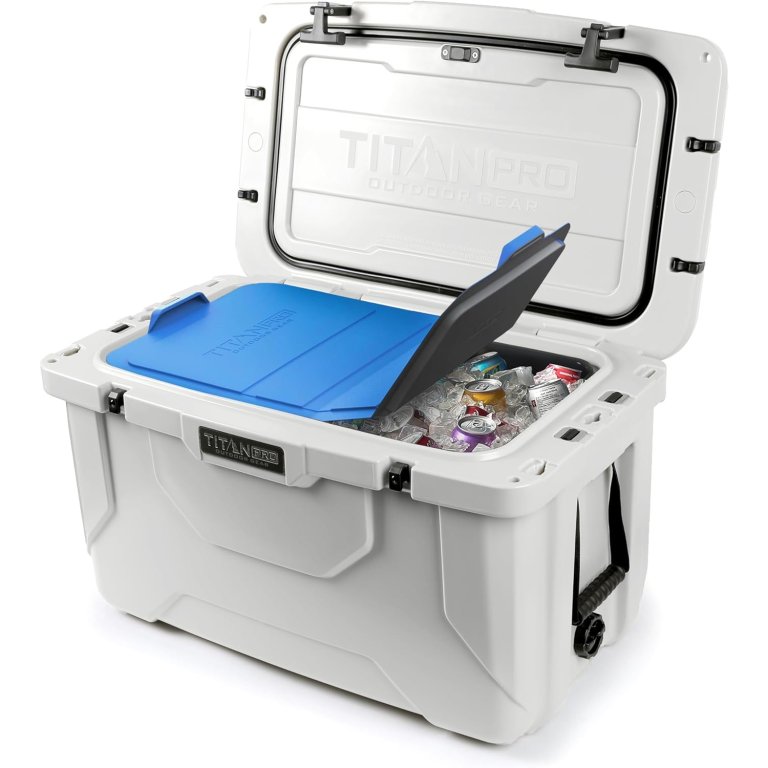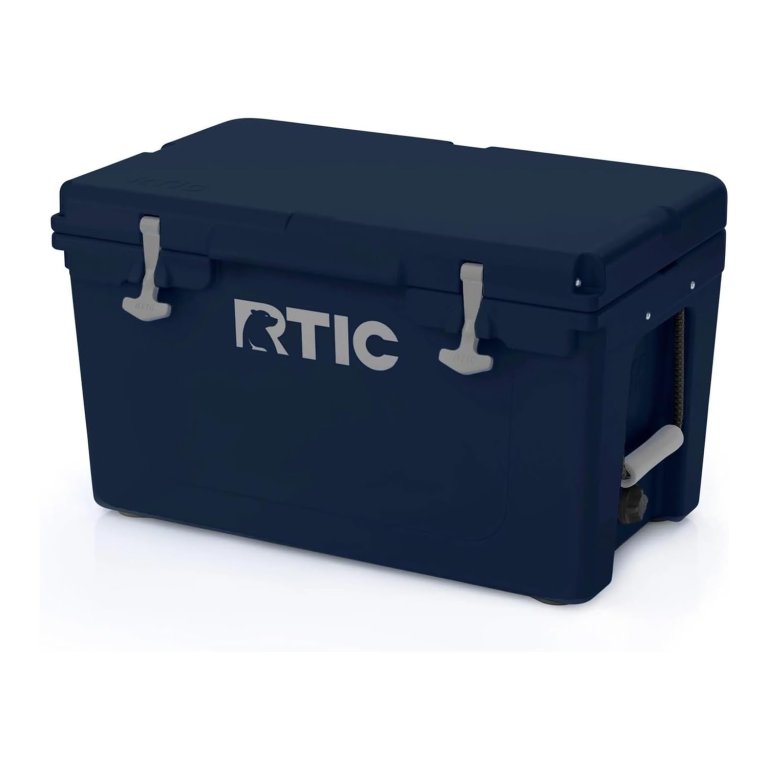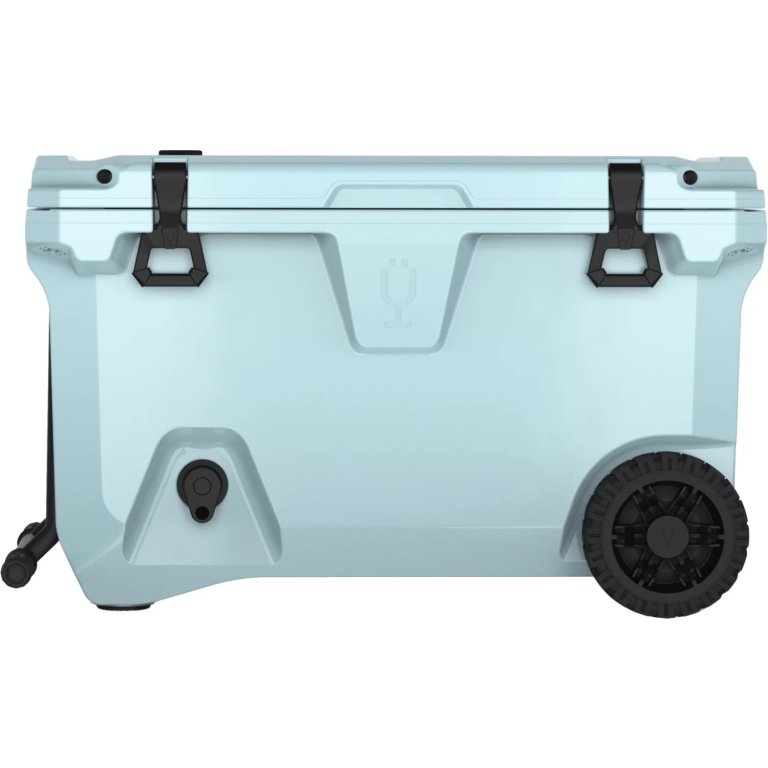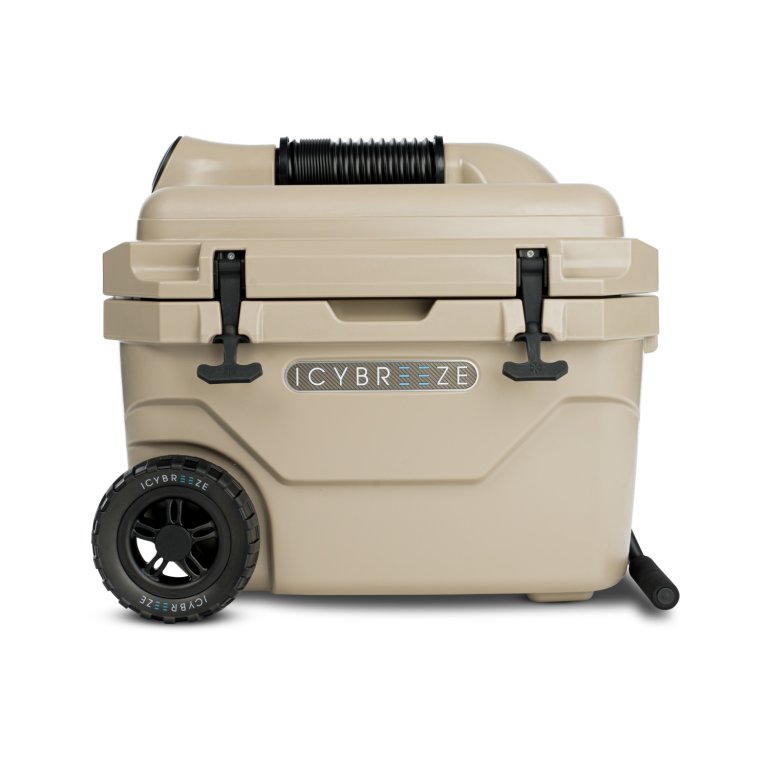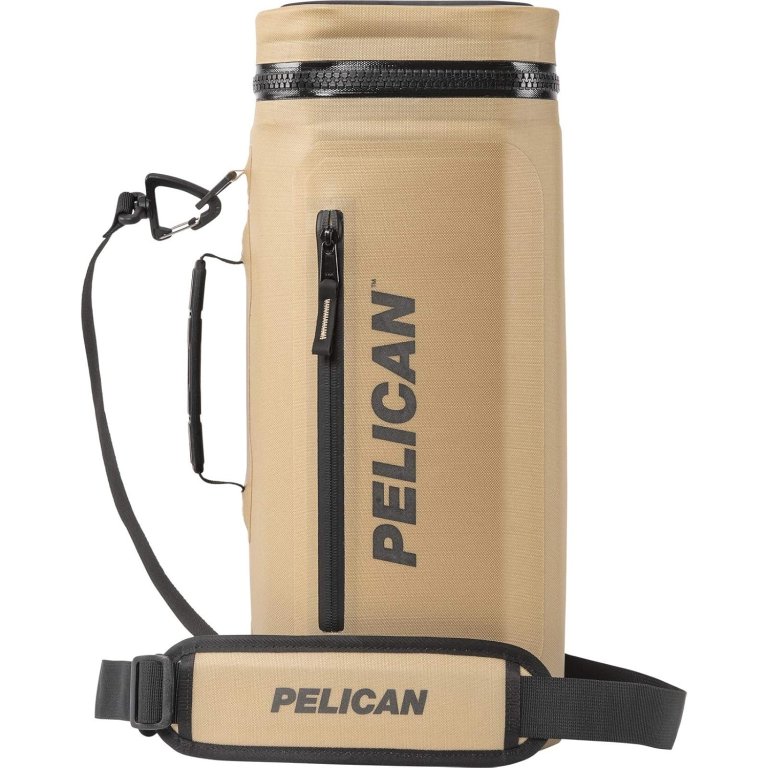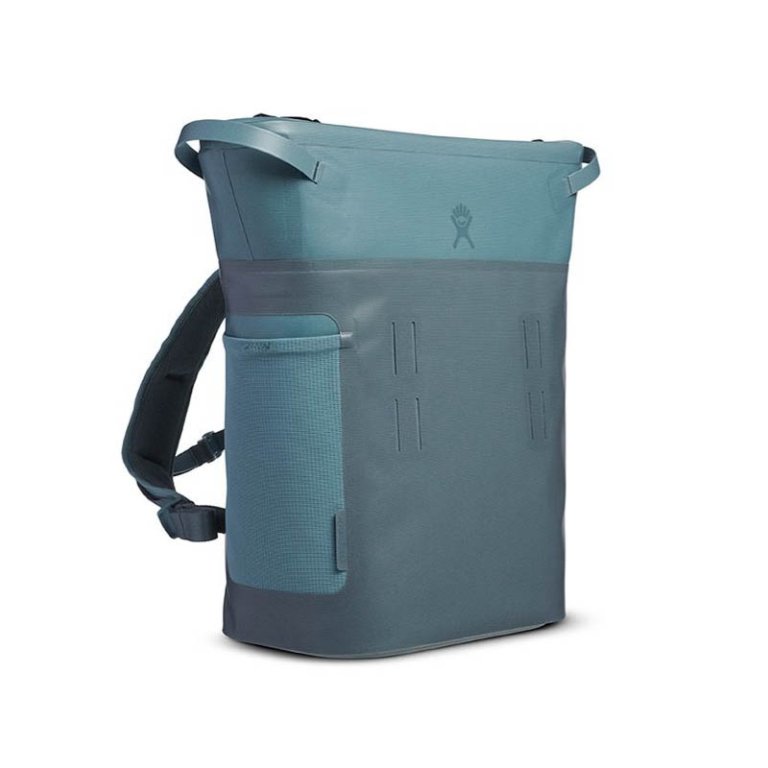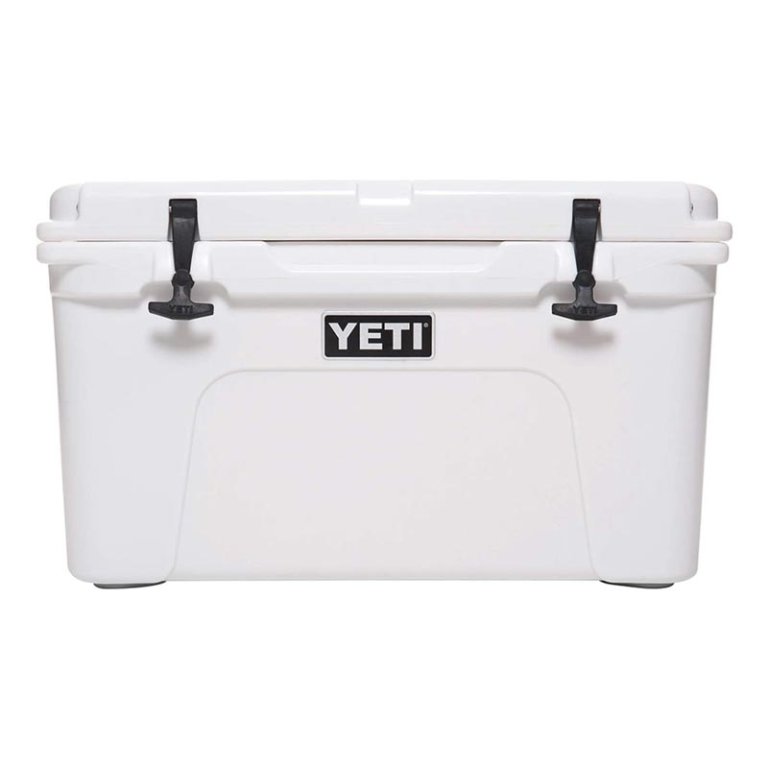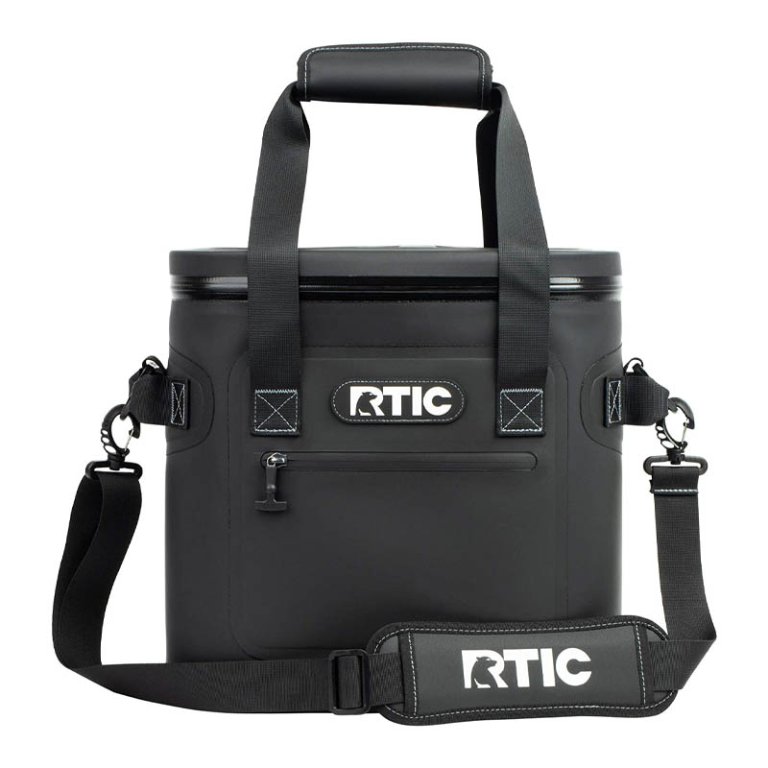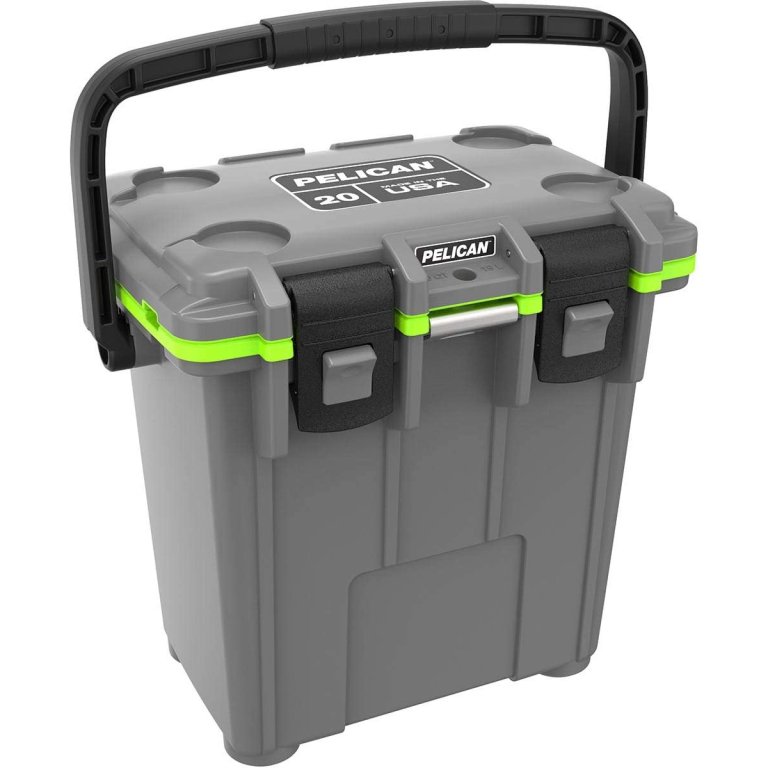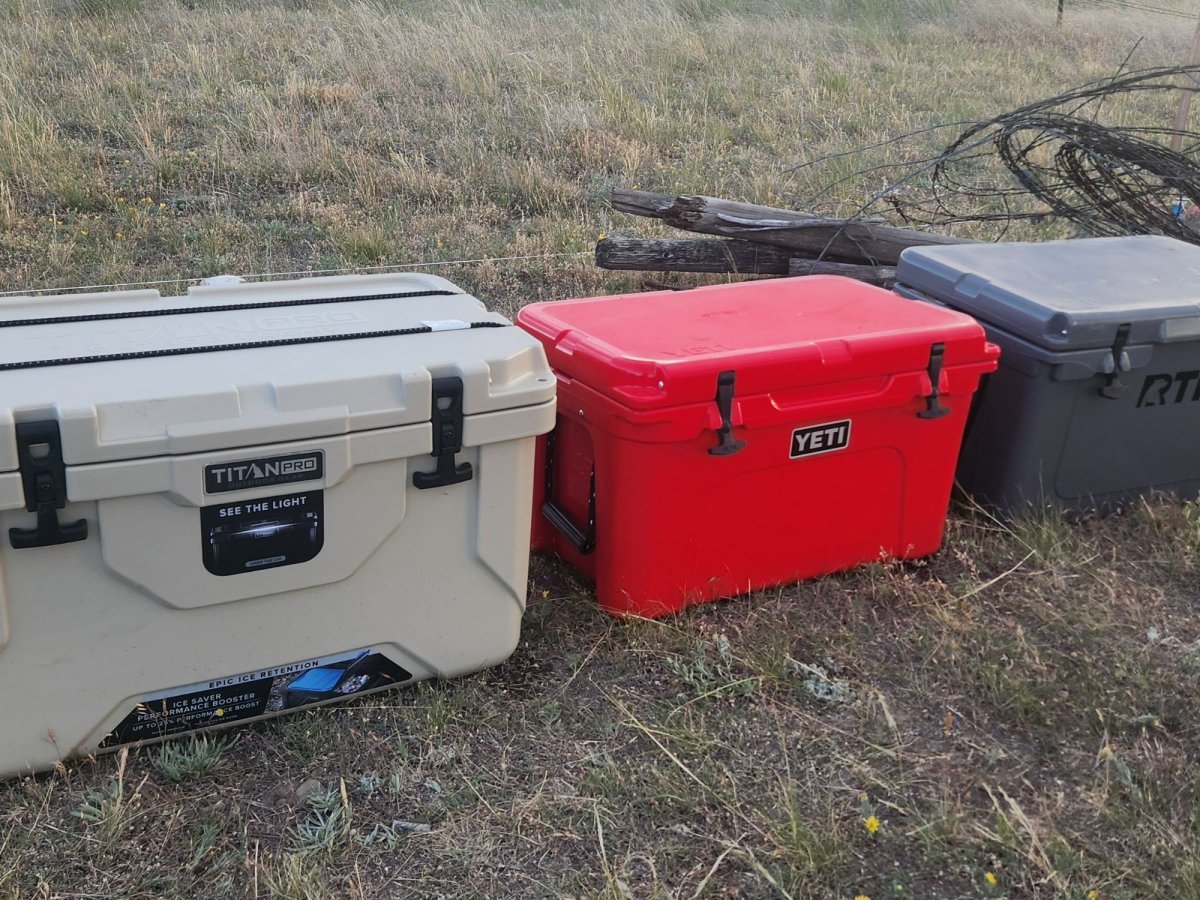
We may earn revenue from the products available on this page and participate in affiliate programs. Learn More ›
Coolers have come a long way since the clunky, heavy models of previous years, but with such a large array of sizes and styles available these days, choosing the best ones for your needs can be challenging. To help you decide what outdoor gear can keep your food and drink ice cold, we put a host of popular models through their paces, testing them in real-world conditions to see how well they function.
We used the coolers on boats, at campsites, and in the yard. Each cooler was tested in full sun, in the shade, and in changing conditions. Our favorite is the Arctic Zone Titan Pro 55-Quart Cooler thanks to its smart design, Ice Saver feature, and interior LED light. We were impressed by the utility and performance of several other models as well, and it’s clear the cooler market is loaded with options.
But, as we found in testing, there are a lot of great options. Find out why we consider these models the best coolers around.
- BEST OVERALL: Arctic Zone Titan Pro 55-Quart Cooler
↓ Jump to Review - RUNNER-UP: Coleman Reunion 54-Quart Steel Belted Cooler
↓ Jump to Review - BEST BANG FOR THE BUCK: RTIC 45-Quart Ultra-Tough Cooler
↓ Jump to Review - BEST WITH WHEELS: BrüMate BrüTank 55-Quart Rolling Cooler
↓ Jump to Review - BEST FOR HOT DAYS: IcyBreeze Ultimate Cooler
↓ Jump to Review - BEST SLING COOLER: Pelican Dayventure Sling Cooler
↓ Jump to Review - BEST WATERPROOF BACKPACK: HydroFlask 20 L Day Escape Soft Cooler
↓ Jump to Review - BEST HARD SHELL: Yeti Tundra 45 Hard Cooler
↓ Jump to Review - BEST SOFT SHELL: RTIC Soft Pack Cooler
↓ Jump to Review - BEST SMALL SIZE: Pelican 20-Quart Elite Cooler
↓ Jump to Review
| Testing Stats | |
| Products tested | 10 |
| Time spent testing | 2 to 3 weeks |
| Tests performed | 3 |
| Price range | $90 to $500 |
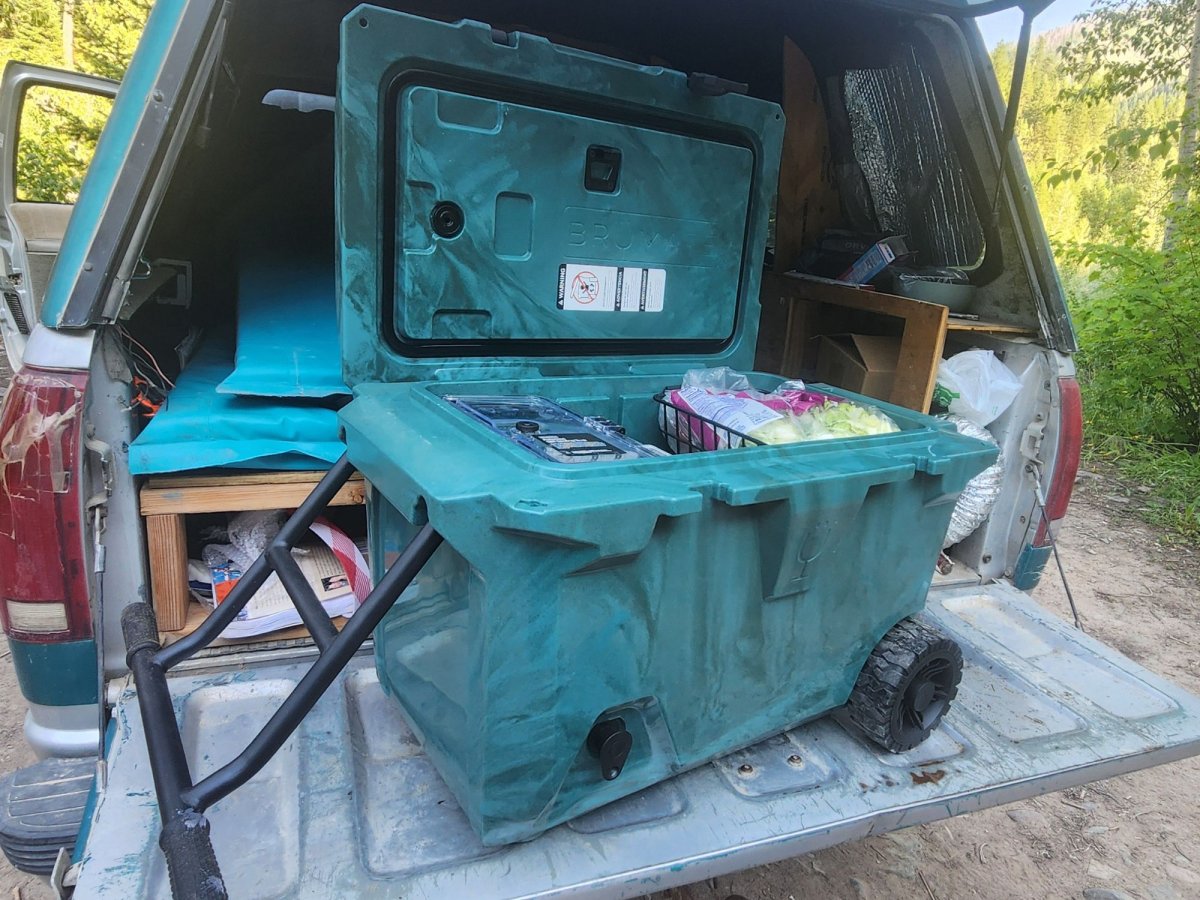
Our Top Picks
The best coolers win high ratings for durability and efficiency. We tested the following popular models—in the Miami and Montana heat—and found them all to be excellent quality. Depending on your needs, you’re likely to find a great option in this roundup of top-rated coolers.
Best Overall
Arctic Zone Titan Pro 55-Quart Cooler
What We Like
- Extended ice retention from interior cover
- Interior LED light for night use and visibility
- Dual drain plugs
- Ultra-secure latches are easy to use
What We Don’t Like
- Doesn’t have a full lip to integrate with raft frames
Product Specs
- Weight: 31.95 pounds
- Size: 17.68 inches tall by 29.25 inches wide by 17.28 inches deep
- Capacity: 55 quarts
Our Ratings: Performance 5/5; Portability 4/5; Durability 5/5; Value 4.7/5
This rotomolded Titan Pro cooler by Arctic Zone really hit the right notes in terms of size, construction, and features. It’s very thoughtful in the way everything is designed and laid out, making it the perfect camp cooler in our opinion. We loved the security provided by smooth- locking cam latches, and the removable LED light is a game changer while camping.
At 55 quarts, it’s slightly larger than the Yeti Tundra 45 and RTIC 45. However, we found the capacity suitable to meet the needs of a small group for 3 to 4 days of camping. The bungees on the lid are useful for holding down blankets and gear while you’re carrying the cooler, and we also used them to attach a flotation device that worked perfectly as a seat pad.
The surprising differentiator was the Ice Saver, which is a thin, foam-style cover for the ice in the cooler. When laid over the ice, it removes empty space and actually seems to make the ice last longer. When you consider the interior dry bin, stout carry handles, and included bottle opener, this cooler is a serious winner.
Lastly, we liked the drain plug with the tether so it won’t fall out or get lost. The padlock slot makes it bear-proof and lockable as well. The only thing that didn’t work out for us was the lip design, which means the cooler won’t sit on raft frames as a seat. This is a highly specialized use, however, and it won’t impact most cooler owners.
Get the Arctic Zone cooler at Amazon or Arctic Zone.
Runner-Up
Coleman Reunion 54-Quart Steel Belted Cooler
What We Like
- Keeps ice frozen as long as advertised
- Attractive retro design and detailing
- Have-A-Seat Lid
- Bottle opener attached to the front
What We Don’t Like
- Latch sometimes slips
- Lacks wheels
- Matte black version gets hot in the sun
Product Specs
- Weight: 18.38 pounds
- Size: 16.25 inches tall by 24.375 inches wide by 16.25 inches deep
- Capacity: 54 quarts
Our Ratings: Performance 5/5; Portability 4/5; Durability 5/5; Value 4.5/5
Don’t be fooled by the classic 1950s vintage vibe! Modern features abound on the Coleman Reunion cooler. The painted steel body houses an insulated interior with a 4-day ice retention capability, even when temperatures soar to 90 degrees Fahrenheit. When we put it to our Miami ice challenge, it held up great: We found solid ice inside 4 days later, and after 5 days, the water was still cold.
Measuring 16.25 inches tall by 24.375 inches wide by 16.25 inches deep, this Coleman is roomy enough to hold eighty-five 12-ounce cans, stand 2-liter bottles upright, or hold enough sandwiches for a crowd. A leak-resistant channel drain means the cooler doesn’t need to be tipped over to empty out melted ice. We appreciated that the rugged cooler boasts a Have-A-Seat Lid (helpful when chairs are scarce), comfort-grip handles, and a bottle opener permanently attached to the front. Such features are handy for beach parties and tailgating events.
Our only real issue was finding that the rust-resistant stainless steel lid hatch can be tricky to use unless it’s completely vertical with the tip pointing down at 180 degrees. Plus, while lighter colors are available, the matte black paint on the cooler we tested became quite hot in the sun.
Get the Coleman cooler at Amazon, or Dick’s Sporting Goods.
Best Bang for the Buck
RTIC 45-Quart Ultra-Tough Cooler
What We Like
- Simple, durable design
- Lip sits on raft frame bars for use as boat seat
- Durable rubber latches lock the lid tight
- Retains ice very well
- Drains well with its dual plugs
What We Don’t Like
- A little on the heavy side, but that’s the trade-off for more insulation
Product Specs
- Weight: 26.6 pounds
- Size: 15.5 inches tall by 26 inches wide by 15.625 inches deep
- Capacity: 45 quarts
Our Ratings: Performance 4/5; Portability 4/5; Durability 5/5; Value 4.7/5
RTIC hits a fantastic price point with an ultra-durable rotomolded cooler. The design features mirror those of the Yeti to a large degree, and while it’s not a cheap cooler, the price is significantly lower. We love the overall build, and the rubber handles, latches, and drain plugs are all easy to swap out, making it possible to keep the cooler in use indefinitely.
The dual drain plugs are a nice feature on this cooler. They dump water quickly or slowly, depending on your preference while attempting to manage ice. The interior basket works well for dry goods, and the cooler can double as a seat. As with many rotomolded coolers, the thick insulated walls and hard shell make for a heavy design. This shouldn’t deter buyers, however, because these elements are the primary reason ice lasts longer.
In fact, it took 3 days of full sun to melt the ice in the cooler (loaded to half capacity). It performed at the same levels as the Yeti and was barely behind the Arctic Zone Titan. We can see this outdoor cooler being a regular partner for personal rafting trips, as it fits snugly in a raft frame and doubles as a seat.
Get the RTIC 45-quart cooler at RTIC.
Best With Wheels
BrüMate BrüTank 55-Quart Rolling Cooler
What We Like
- Rugged wheels and handle make it easy to maneuver
- Drink tank is fun and easy to use
- Large interior space holds plenty of ice and drinks
- Beefy rubber latches
What We Don’t Like
- Drink tank requires extra cleaning and maintenance
Product Specs
- Weight: 44.5 pounds
- Size: 19.5 inches tall by 32.5 inches wide by 19.5 inches deep
- Capacity: 55 quarts (48 cans)
Our Ratings: Performance 4/5; Portability 4/5; Durability 4/5; Value 4.3/5
The BrüMate BrüTank is the most unique cooler in the rotomolded space. It’s heavy-duty, holds ice for days, and is loaded with features. Because of its weight, this model would be best suited for gatherings, grilling, beach trips, and campsites, or where it will be largely stationary.
It has a fun drink-mix chamber and tap for ice-cold drinks all day. For our tests, we added some ice and juice, and it was fun to have cold beverages on demand at camp. The tank uses a vent cap on the cooler lid to control pressure while allowing the tap to function perfectly. Even with the drink tank, the cooler still has plenty of interior space. You will need to take extra steps to clean the tank, but it’s not a big effort.
While this cooler might not be ideal for campers who are moving coolers between boats and vehicles several times a day, it’s a good cooler for those who want a rugged rolling design. We thoroughly enjoyed testing this cooler, and it’s excellent for families and groups.
Get the BrüMate cooler Dick’s Sporting Goods or BrüMate.
Best For Hot Days
IcyBreeze Ultimate Cooler
What We Like
- Included air conditioning works great
- Ideal for short trips on very hot days
- Handle and wheels make it easy to move around
- Battery runs for several hours
What We Don’t Like
- Lower ice retention times
Product Specs
- Weight: 29 pounds
- Size: 21.5 inches tall by 24.5 inches wide by 16.5 inches deep
- Capacity: 38 quarts
Our Ratings: Performance 3.5/5; Portability 5/5; Durability 4/5; Value 4/5
The IcyBreeze is the first cooler we’ve encountered that uses a battery-powered system to generate air conditioning. As such, it lives in a distinct category for those who want to cool drinks and food while simultaneously cooling the air. At first, we weren’t sure what to think about the concept, but it came in handy on hot days. In fact, we pulled the unit into our office to cool things down during a heat wave.
Powering the air conditioning function requires adding water and ice to the cooler. The interior cooler area operates as usual, but a battery plugs into the lid where a control panel allows for air conditioning controls. The Ultimate model even has a mister to add cold water to the air. We were impressed with the battery longevity and fan power; it pumped out cold air for hours and certainly made our space more comfortable.
This cooler is ideal for shorter trips outside. Whether you are heading to a ball game or spending a few hours in the heat, it can keep both drinks and the air cooler. It’s important to note that it uses ice quickly, and with the air conditioner running, you’ll run through your ice in only a half day. For that reason, it wouldn’t be our first choice for extended camping trips.
As a stand-alone cooler, it’s well designed and fairly lightweight. We appreciated the quality handle, and being a cooler with wheels, it was easy to move around. In the absence of the thick-walled insulation of some of the other coolers we tested, this cooler has shorter ice-melt times.
Get the IcyBreeze cooler at IcyBreeze.
Best Sling Cooler
Pelican Dayventure Sling Cooler
What We Like
- Shoulder sling makes it portable and easy to carry
- Room for drinks and a lunch
- Heavy-duty zippers and solid construction
What We Don’t Like
- Small size limits uses
- Will heat up in direct sunlight
Product Specs
- Weight: 7.9 pounds
- Size: 8.5 liters
- Capacity: 9 quarts (6 cans and a few food items)
Our Ratings: Performance 4/5; Portability 5/5; Durability 4/5; Value 4.3/5
In the world of soft-sided coolers, Pelican has several attractive options. This sling model is excellent for stashing a six-pack of cans and a few food items for short trips. Although it works best with ice packs, it can work with cubes as well. The sling strap makes it easy to carry, and the heavy zipper keeps everything inside. It also has an exterior pocket for extra items such as a corkscrew or a few utensils.
We took this cooler on a few day hikes to swim in mountain streams. It’s perfect for short trips, a day on the golf course, and other daily outings where only a few drinks and a lunch are needed. It’s also ideal for just drinks; it would work great as a bottle cooler for wine, or to cool a few beers and sodas. We noticed the outer material heats up a bit when left in direct sunlight. However, we set the cooler in a cold creek and it held a steady temperature all day. We loved the Pelican’s convenience, portability, and functionality, and we envision it getting plenty of use on boat and beach days.
Get the Pelican Dayventure cooler at Amazon or Pelican.
Best Waterproof Backpack
HydroFlask 20 L Day Escape Soft Cooler
What We Like
- Waterproof
- Easy to clean
- Watertight zipper realigns itself
- Lightweight when empty
What We Don’t Like
- Heavy to wear when filled
- Accessories cost extra
Product Specs
- Weight: 2.63 pounds
- Size: 18.12 inches high by 8.47 inches wide by 18.52 inches deep
- Capacity: 20 liters (36 cans)
Our Ratings: Performance 4/5; Portability 3.5/5; Durability 5/5; Value 4/5
With a watertight TRU Zip zipper and what the manufacturer calls “welded seams,” no moisture is getting in or out of this HydroFlask soft cooler. We know it’s true, having both dropped it into a swimming pool when empty (yes, it floats) and taken it on the road packed with ice and cans. With its 600D polyester shell and an FDA food-grade BPA-free liner, this brilliant backpack keeps items cold for up to 36 hours. The company doesn’t claim that ice will stay solid for 36 hours, because it doesn’t. Though ice melted steadily in our tests, we found that the interior stayed plenty cold, thanks to extra insulation on the bottom. This was true even when the cooler was left out on hot sand and pavement.
With laser-cut welded gear attachment loops for dry storage accessories, a side pocket for a water bottle, and a “self-healing” (no teeth) silent zipper that realigns itself, this is one of the most rugged backpack coolers on the market. You can rely on it for the hardest hikes and the toughest bike rides—the padded straps are comfortable, and the back panel prevents the pack from sticking to one’s shirt. It does get heavy when fully loaded with 36 beverage cans, but don’t feel obligated to carry it very far: We discovered it works just fine as a portable poolside ice chest for bottles of wine.
Get the HydroFlask cooler at Hydro Flask, Backcountry, or Dick’s Sporting Goods.
Best Hard Shell
Yeti Tundra 45 Hard Cooler
What We Like
- Rock-solid, durable design that can last forever
- Certified bear-proof
- Backed by the pioneers of rotomolded cooler designs
- Replaceable parts for easy long-term maintenance
What We Don’t Like
- Drain plug isn’t tethered, so it could be easily misplaced
Product Specs
- Weight: 24.6 pounds
- Size: 16.1 inches tall by 25.6 inches wide by 15.5 inches deep
- Capacity: 54 cans
Our Ratings: Performance 4/5; Portability 4/5; Durability 5/5; Value 4.7/5
It’s no secret that Yeti changed the cooler market for the better. The company brought rotomolded coolers into the mainstream, raising the quality of construction, alongside the price of the average cooler. The Tundra 45 is a staple in Yeti’s lineup, and it performs exceptionally well.
This cooler is built to endure tough trips, and it’s a worthy companion to take hunting, fishing and rafting. This cooler sits perfectly in a raft frame and doubles as a seat. The handles are durable, the rubber latches are simple and easy to use, and the interior basket holds dry goods. It also holds ice for days outside of extreme temperatures.
The only negative we encountered is the drain plug. It’s not tethered, and it’s important to pay attention while draining the cooler to avoid losing the plug. Luckily, everything is made to be easily replaced if needed. Yeti has a loyal brand following, great products, and the Tundra does not disappoint as a top-of-the-line cooler.
Get the Yeti cooler at Amazon or Dick’s Sporting Goods.
Best Soft Shell
RTIC Soft Pack Cooler
What We Like
- Waterproof and puncture-proof
- Sweat-proof
- Easy to clean
What We Don’t Like
- Cannot sit in direct sun
- Cannot sit on hot surfaces
- Zipper requires occasional lubrication to remain airtight
Product Specs
- Weight: 3 pounds
- Size: 13.75 inches high by 13.5 inches wide by 9.5 inches deep
- Capacity: 20 cans
Our Ratings: Performance 3.5/5; Portability 5/5; Durability 3/5; Value 4/5
RTIC calls its insulated soft cooler bag the strongest soft-sided cooler out there. The 100 percent waterproof shell is made from puncture- and tear-resistant heavy-duty StayDry nylon. The cooler’s Closed-Cell Insulation––2 inches on the top and 1 inch on the sides––maintains cold temps for up to twenty 12-ounce cans, plus ice and snacks, making it a great beverage cooler option.
It boasts a no-leak zipper (which requires occasional application of an included lubricant to stay in working order). An exterior pocket holds dry items such as utensils, napkins, and even a phone, and the No-Sweat shell keeps the cooler dry on the outside. The antimicrobial liner resists mildew, which we consider another plus since this model can be stored in a garage or basement without the user worrying about mildew growth.
On the downside, this model cannot be placed directly on a hot surface, such as the deck of a boat or the back of a truck, without negatively affecting performance. We discovered that keeping the cooler in direct sun causes ice to melt much faster than the advertised 5 days, and doing so can ultimately harm the material. This is clearly problematic if you’re heading for a location without shade. But we love the fact that this model floats, so we would certainly take it on a kayak or rafting adventure, or even on a forest hike.
Get the RTIC soft pack cooler at RTIC Outdoors.
Best Small Size
Pelican 20-Quart Elite Cooler
What We Like
- Basic cooler for smaller needs
- Push-button latches are easy to open
- Narrow, tall design fits where other coolers don’t
What We Don’t Like
- Lacks a drain plug
Product Specs
- Weight: 12.52 pounds
- Size: 18.8 inches high by 17.7 inches wide by 12.6 inches deep
- Capacity: 21.5 quarts (15 cans)
Our Ratings: Performance 3.5/5; Portability 5/5; Durability 5/5; Value 4.5/5
The Pelican Elite is a cooler but it can also function as a hard case if needed. It has the quality expected from Pelican products with great push-button latches and a convenient shape. We like the tall, narrow design because it takes up less floor space in vehicles and boats. The handle is sturdy, and the cooler is a bit like an oversize lunch box. In fact, it’s the perfect mini cooler for holding lunch and drinks for two people on a day trip.
The only downside with this cooler is the lack of a drain plug. To avoid having to manage excessive water from melted ice cubes, you might prefer to use ice packs. During our tests we filled it with ice, then simply dumped it after our trip; the size of the cooler makes this very easy to accomplish.
For days when you don’t need a bulky cooler, this one carries plenty without requiring much effort to move around. We’ll be using this one when we go on short fishing trips and when we hit the woods to cut and stack firewood.
Get the Pelican Elite cooler at Amazon or Pelican.
Jump to Our Top Picks
How We Tested the Best Coolers
During our testing of several coolers in Montana, the summer heat hit near-triple digits. Each of the six models we tested was filled halfway with ice and an equal number of drinks. The coolers were set in direct sunlight for 3 days, and we checked the ice twice daily and drained the water once each day. This initial ice retention test was excellent for setting real-world expectations in a controlled and equal-temperature setting.
The coolers were then drained, refilled, and individually used on several rafting trips, camping trips, and for backyard drinks and barbecues. We tipped them upside down in a leak test, and every feature was thoroughly used and tested for performance.
The determining factors for each award include price/value, capacity, durability, features, functionality, and ice retention. The remaining coolers in the award categories were tested in the Miami heat in a previous testing cycle, and they held their award places based on the same criteria.
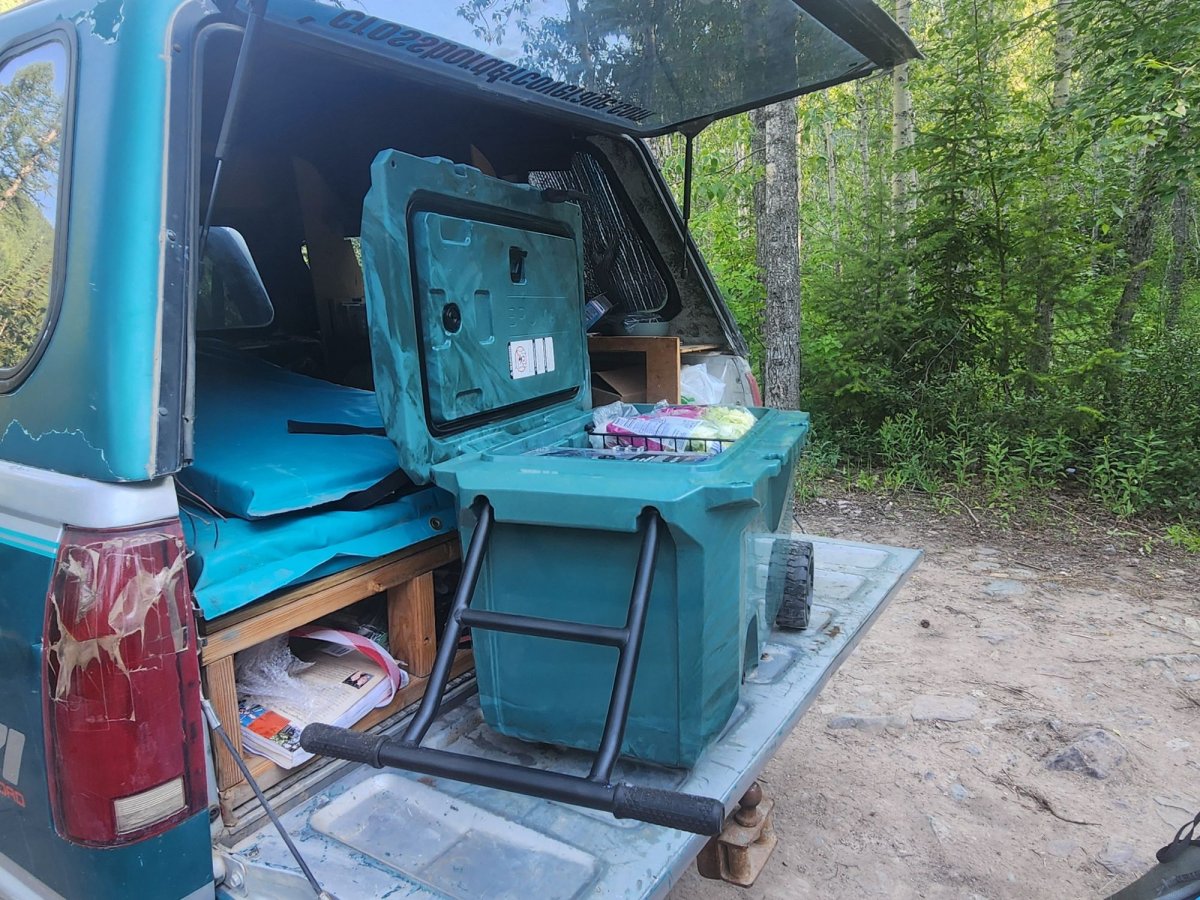
What to Consider When Choosing a Cooler
The only defining element of a cooler is that it keeps food and beverages chilled. Otherwise, size, features, and price are as varied as those of refrigerators. Before purchasing a cooler, ask yourself:
- How much food and drink should the cooler hold?
- Do you want to keep food cold for a few hours or several days?
- Should the cooler be strong enough to keep out wildlife—including bears?
- Will you be carrying the cooler from place to place often, or will it be more stationary?
Beyond these starter questions, consider the following to narrow the field to the best cooler for your needs.
Material and Insulation
One of the more fundamental choices is between hard-sided and soft-sided coolers, each of which suit different lifestyle preferences and practices.
Hard-sided coolers tend to be best for folks who regularly go camping, travel in an RV, or prefer to keep a cooler outside. They’re the more durable option, as they are often constructed with double-walled plastic and foam insulation between the inner and outer walls and the top lid, which should be airtight. Some heavy-duty models retain visible ice for 4 to 5 days and cold temperatures for up to a week. Many such models are manufactured via rotomolding (short for “rotational molding”), a manufacturing process that spins the mold as the plastic is poured, making for a more uniform and better-insulated cooler. This high-performance technique typically means a higher price tag.
Soft-sided coolers are ideal for many short-term jaunts, such as picnics, day hikes, commuting to work, and beach outings. These coolers will generally keep food cold for up to 1 day, though some may stay cool even longer because of high-density foam insulation, locking lids, and efficient zippers. Most soft-sided models are lined with easy-to-clean, food-safe insulating nylon. Soft-sided coolers are generally smaller and lighter than hard-sided models, and some fold for easy storage.
Capacity
Cooler capacity determines how much can be packed inside. Capacity is usually measured in quarts and can range from 5 quarts (popular among commuters) to 150 quarts for weeklong storage, such as when camping or on an RV trip.
For day trips, tailgating, and similar events serving two or three people, a 25-quart model is spacious enough for most needs without sacrificing portability. When two or three people take a weekend trip, a 45- to 60-quart cooler should suffice. A small group planning to be off the grid for an extended time might consider a cooler in the 100- to 150-quart range.
When thinking about size, it’s important to note that a cooler is more efficient when packed tightly, so don’t choose a model that you likely won’t fill. If you have changing needs, you may want to invest in both a small cooler and a larger unit.
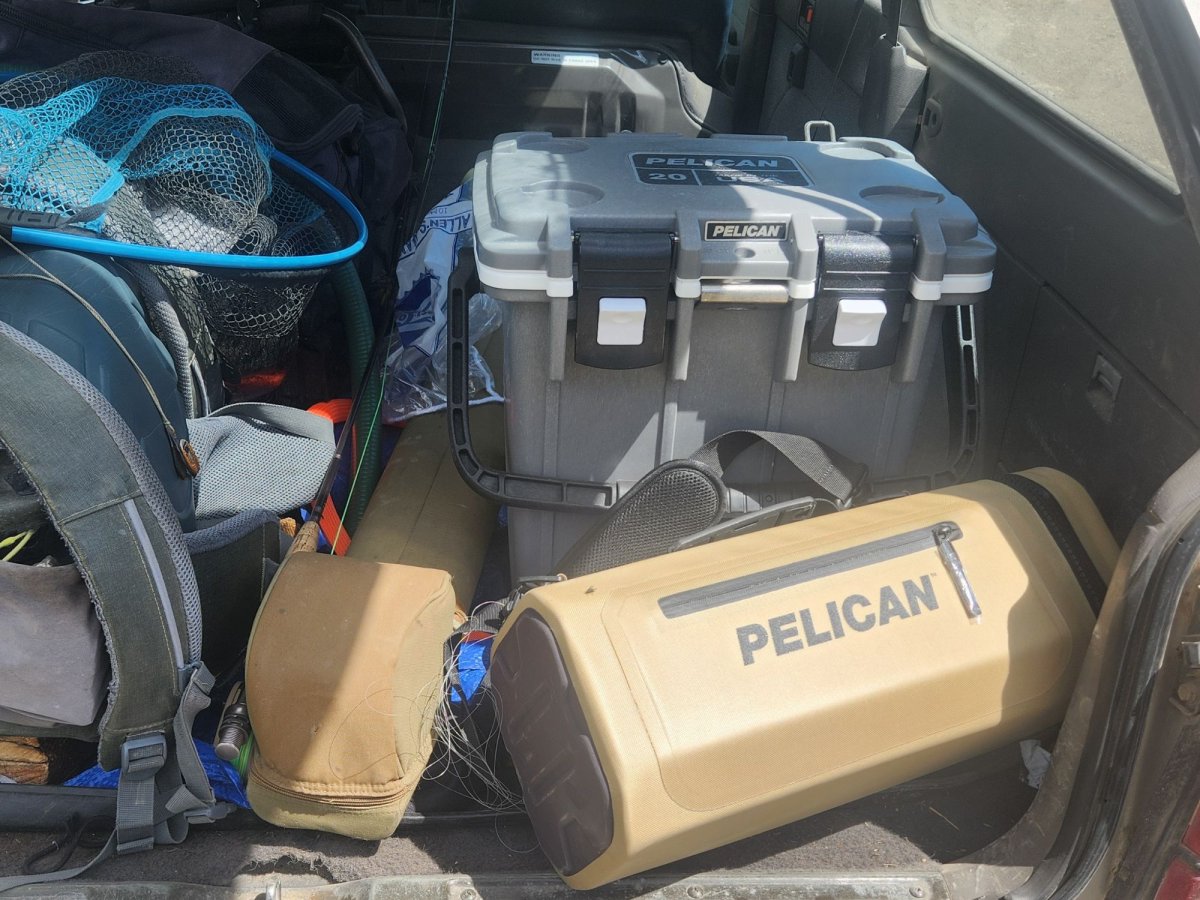
Portability
If a cooler will often travel with you, portability is critical, so when thinking about how far you’ll need to carry it, remember that there’s a wide range of sizes and weights on the market to choose from. Hard-shelled versions are the heaviest, sometimes weighing up to 50 pounds, but these models are often on wheels and have an extended handle for easier portability. Puncture-resistant all-terrain tires on the most heavy-duty models allow for passage on rugged surfaces. Soft-sided coolers are lighter weight and can commonly be toted on your shoulder or in your hand. Backpack versions are especially popular with hikers and beachgoers.
Compartments
Every time a cooler is opened to the air, its contents are somewhat compromised, so the easier it is to quickly grab what you want rather than hunt around, the better. So while some models simply have one large compartment that gets filled with ice and the items to be chilled, others feature dividers that keep food and drinks organized. Dry bins or bags are also convenient, as they’re designed to keep such items as sandwiches apart from the ice so they stay dry. There are even coolers with shelves that enable you to separate hard and soft items, such as canned goods and fruits, so that your soda won’t crush your peaches. Also convenient are exterior pockets for utensils, hand wipes, paper products, and other items that don’t require chilling.
Additional Features
Coolers may come with a variety of bells and whistles, including cup holders, can openers, and even lights. Some marine coolers come with fish scales and rulers for use on watercraft. And there are party-friendly models that have a separate drink compartment nestled in the ice with a built-in tap; this lets you pack punch or lemonade and serve it directly from the cooler. Serious campers will want to consider a wilderness-worthy cooler that includes a bear-resistant locking system. Features that support convenience and cleanliness, like drain plugs and washable linings, are a plus. And for carrying comfort, padded shoulder straps on soft coolers are a bonus.
Budget
Cooler prices vary widely, with premium models potentially costing triple that of lower-end competitors’ offerings. The best way to figure out how much to invest is to consider your lifestyle requirements. If you need to keep food and drinks cold for a picnic or beach day, a low- to midrange choice with one compartment may suit your needs. If you plan to rely on the cooler for a week or more, consider a durable, premium cooler with multiple compartments.
FAQs
Wondering how a cooler works or how to pack it correctly? Curious about how long it will keep food cold? These answers to common questions that may come up while shopping for the best coolers can help.
As a general rule, the proper ratio is 2:1 ice-to-food/beverage. A cooler is more efficient when packed tightly, so try to eliminate air pockets—air is the enemy of ice. Start with one layer of food or drink at the bottom (items you will want last), followed by a layer of ice, and then continue alternating layers. Ice should be the final layer, with whatever food and drink you require first right under it.
The heaviest-duty hard-shelled coolers can keep food cold for up to a week or in some cases 10 days, while soft versions typically keep ice frozen for a day or two at most. To keep the food at its coldest, prechill a cooler by prepping it with ice beforehand, then throw that ice away before packing with fresh ice and food items. The smallest models can be prepped right in the refrigerator. Always chill or freeze food and beverages so that they stay colder as well. Sprinkling rock salt on top of the ice can make it last longer. Finally, do not remove the water from the ice as it melts since the melted water helps keep the remaining ice insulated.
Coolers keep your food and drinks cold with ice, thanks to the foam insulation between the inner and outer walls and along the top lid.
Meet the Testers
Zach Lazzari is a freelance writer with over a decade of professional writing experience. He splits his time between the great outdoors, travel, and DIY projects ranging from camper builds to home renovations and maintenance. His home base in Montana is the perfect testing ground for outdoor products and equipment.
An award-winning food writer, restaurant critic, and poet, Miami-based Jen Karetnick is the author of 21 books, including four cookbooks and four guidebooks. After farming a historic mango grove for 20 years, she now lives in a restored 1926 Tudor house with her husband, two children, two dachshunds, and four cats.
Additional research provided by Kristen Mosier.



